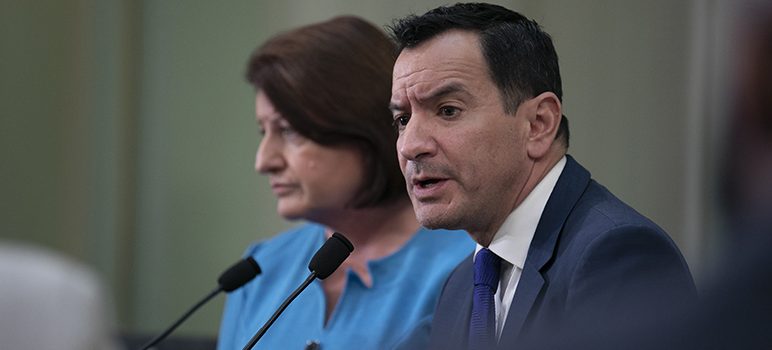Nothing to see here.
That was the essence of what Assembly Speaker Anthony Rendon had to say after fundraising by one member of his house triggered an investigation by California’s political watchdog agency, and payments by another prompted calls to tighten the state’s political ethics law.
As CalMatters reported in its “Sweet Charity” series, nonprofits created by individual lawmakers or special caucuses of lawmakers are an increasingly common way to raise and spend money outside the limits of campaign finance law.
But Rendon, a Democrat from Lakewood, said these affiliated nonprofits “can provide valuable resources” and that he has no problem with them “if people are going about their activities ethically and with full transparency.”
He brushed off a report about Democratic Assemblyman Rob Bonta of Alameda helping raise $588,000 for organizations that employed his wife—a situation that prompted an author of California’s Political Reform Act to say the law should be changed to prohibit politicians from soliciting money for groups that employ their spouses.
“A lot of our spouses’ employers likely do good work,” Rendon said.
He declined to comment on the investigation the Fair Political Practices Commission launched of Democratic Assemblyman Evan Low of Campbell, after CalMatters revealed that he had ceased reporting donors to a nonprofit foundation affiliated with the technology caucus he chairs. Nor would he weigh in on whether lawmakers generally should be required to identify who funds nonprofits tied to them or their staffs.
“I’m not sure if there should be a change,” Rendon said. “I think in general, the more transparency we have, the better.”
But even as he called for transparency, Rendon did not endorse changing any laws or rules of the Assembly, nor did he call on his members to change their conduct.
It was a stark contrast to the way an earlier speaker handled a similar situation.
In 2011, when the Latino Caucus stopped reporting who donated to its affiliated nonprofit, then-Speaker John Perez demanded that his fellow Democrats change their ways. He said he was “deeply concerned” with the secrecy and called on the Latino Caucus to report donors. After public pressure and a shaming by the speaker, the caucus began disclosing those donors.
The difference could be personality-driven.
Perez was famously heavy-handed. Rendon has a longstanding practice of decentralizing power within the Legislature’s lower chamber, deferring to the Assembly members who chose him as their leader.
But their divergent responses may also be explained by the different political circumstances that shape their tenure in the Capitol. Perez was speaker during an era of tight term limits that meant no one could hold power for very long. The Assembly had eight speakers in the 20 years from 1996 to 2016.
Rendon took the gavel in 2016 under a change of term limits that could allow him to maintain power until 2024—if his fellow Democrats want to keep him.
“He has to tread lightly because he needs the support of (Assembly Democrats),” said political analyst Sherry Bebitch Jeffe.
“It doesn’t surprise me that Perez would take a harder stand than Rendon, because so much has changed.”
Recently introduced legislation would revise California’s political ethics law—but that bill would broaden the circumstances under which officials could avoid publicly reporting donations to nonprofits at their request, a practice known as “behested payments.”
The bill says electeds would not have to report donations made in response to an invitation to an event hosted by a nonprofit unless the officials make “a direct written or verbal request for a payment for a legislative, governmental, or charitable purpose.”
But Democratic Assemblywoman Cristina Garcia said her bill has nothing to do with Low, who is being investigated for not reporting donations to the nonprofit linked to the tech caucus he chairs, the Foundation for California’s Technology and Innovation Economy. The nonprofit is run by a board with close ties to Low, including his chief of staff. Low said he wasn’t required to report the donations because he did not personally solicit them, instead hiring a staff member to moonlight as the foundation’s fundraiser.
Garcia said her goal is not to permit that practice. She said she wrote the bill so that electeds will not have to report donations made to organizations when their name appears on an invitation as one of dozens of politicians on an “honorary committee” supporting the event. “I don’t plan to expand it beyond honorary committees,” Garcia said. “I’m trying to keep this as narrow as possible.”
This report was produced by CalMatters, a nonprofit, nonpartisan media venture explaining California policies and politics.

